Final Bow
CSU's Wes Kenney to retire after 20 years story by Haley Candelario cover photo by John Eisele published May 3, 2023In early February, high school students from across Colorado participating in All-State Orchestra gathered in the University Center for the Arts’ Griffin Concert Hall to watch Colorado State’s University Symphony perform.
Pre-concert chatter ceased as the lights dimmed in the hall and illuminated the performers onstage. Maestro Wes Kenney stepped out to applause and introduced the pieces to the audience: “Sundagger,” a commissioned piece by CSU Composition Professor James David; the first and third movements of Florence Price’s Symphony No. 3 in C Minor, and finally “Uranus,” “Saturn” and “Jupiter” from Gustav Holst’s “The Planets.”
It’s the atmosphere in the concert hall after the “Saturn” movement that Kenney recalls most clearly.
“I was telling the orchestra, ‘You could have heard a pin drop,’” Kenney said. “We’re talking about a bunch of teenagers from All-State Orchestra, but I told them, ‘You had them.’”
Moments like these fill Kenney’s memories at CSU. From performing Gustav Mahler’s first symphony to collaborating on full-length operas to performing major orchestral works at the Colorado Music Educators Association, many agree that Kenney, a University Distinguished Professor and director of CSU Orchestras, leaves a legacy of quality music behind as he retires at the end of the 2022-23 academic year.
Kenney started at CSU during Fall 2003, coinciding with an offer to direct the Fort Collins Symphony Orchestra. Both ensembles had room to grow, said Forest Greenough, an associate professor in double bass and music theory.
Greenough, who was a graduate student at the University of Northern Colorado and played with the Fort Collins Symphony Orchestra at the time Kenney was hired, said Kenney was instrumental in improving the quality of CSU’s orchestra program to further its reputation as a top music school in the state.
“We have a lot of strong (music school) options in the area. Back in that era, (CSU) wasn’t considered on the top of most people’s minds, and now it’s right in discussions with everyone else,” Greenough said. “I got to see how having him here as our orchestra conductor was really beneficial, just in upping the standards and the quality to help build the reputation of our program.”
In his second year at CSU, Kenney began implementing changes to the program.
At the time, CSU had the University Symphony Orchestra and the Theatre Orchestra; both were auditioned groups, but Kenney said the players in the Theatre Orchestra needed more experience to play in the CSU Symphony. From there, Kenney turned the Theatre Orchestra into Sinfonia, a smaller auditioned ensemble primarily specializing in 18th century repertoire and occasionally select 20th and 21st century music. That switch then created the CSU Concert Orchestra, a non-auditioned ensemble.
The next change involved lengthening the rehearsal time from an hour and 15 minutes every week to five hours of weekly rehearsal time, so players could build up the endurance for a standard professional orchestra, which usually lasts two and half hours with a 10-minute intermission.
Kenney said that, without changes to the program, the orchestra would not have been able to perform some of the works the CSU Symphony ended up programming.
“I think it’s afforded the orchestra an opportunity to not only strengthen themselves so that they can play bigger, broader, larger repertoire, but also get their ability to concentrate to a level that is on par with what professional orchestras expect of students,” Kenney said. “What we have done as far as changing the model and how it operates has been very successful. … The orchestra program has, in my opinion, exceeded anything that anyone might have imagined 20 years ago.”
A Monumental Close
Join us on May 4 and May 5 at 7:30 p.m. at the University Center for the Arts as we celebrate Maestro Wes Kenney’s retirement with a performance of Mahler’s gigantic Symphony No. 3. The concert features the CSU Symphony, CSU Choirs, CSU faculty Nicole Asel as mezzo-soprano soloist, and the Centennial Children’s Choir. Tickets are available at csuartstickets.com.
Following the performance on May 4, an open reception for Maestro Kenney will be held in Runyan Hall in the University Center for the Arts.
Works that stand out to Kenney include Gustav Mahler’s first, fifth and seventh symphonies, Igor Stravinsky’s “Rite of Spring,” and Maurice Ravel’s second suite from the ballet “Daphnis and Chloe,” all of which had never been performed by the CSU Symphony before. Additionally, the first time CSU’s music program ever performed a full-length opera was during Kenney’s tenure, which was possible with help from instrumental and vocal faculty who recruited students and had the vision to train them to a capability of performing an operatic work, Kenney said.
Along with programming major orchestral works, Kenney said he has made a conscious effort to include compositions by composers who are Black, Indigenous and people of color to foster diversity, equity and inclusion. Recent works include Florence Price’s Symphony No. 3 in C minor and Silvestre Revueltas’ “La noche de los mayas,” and Fela Sowande’s “African Suite.”
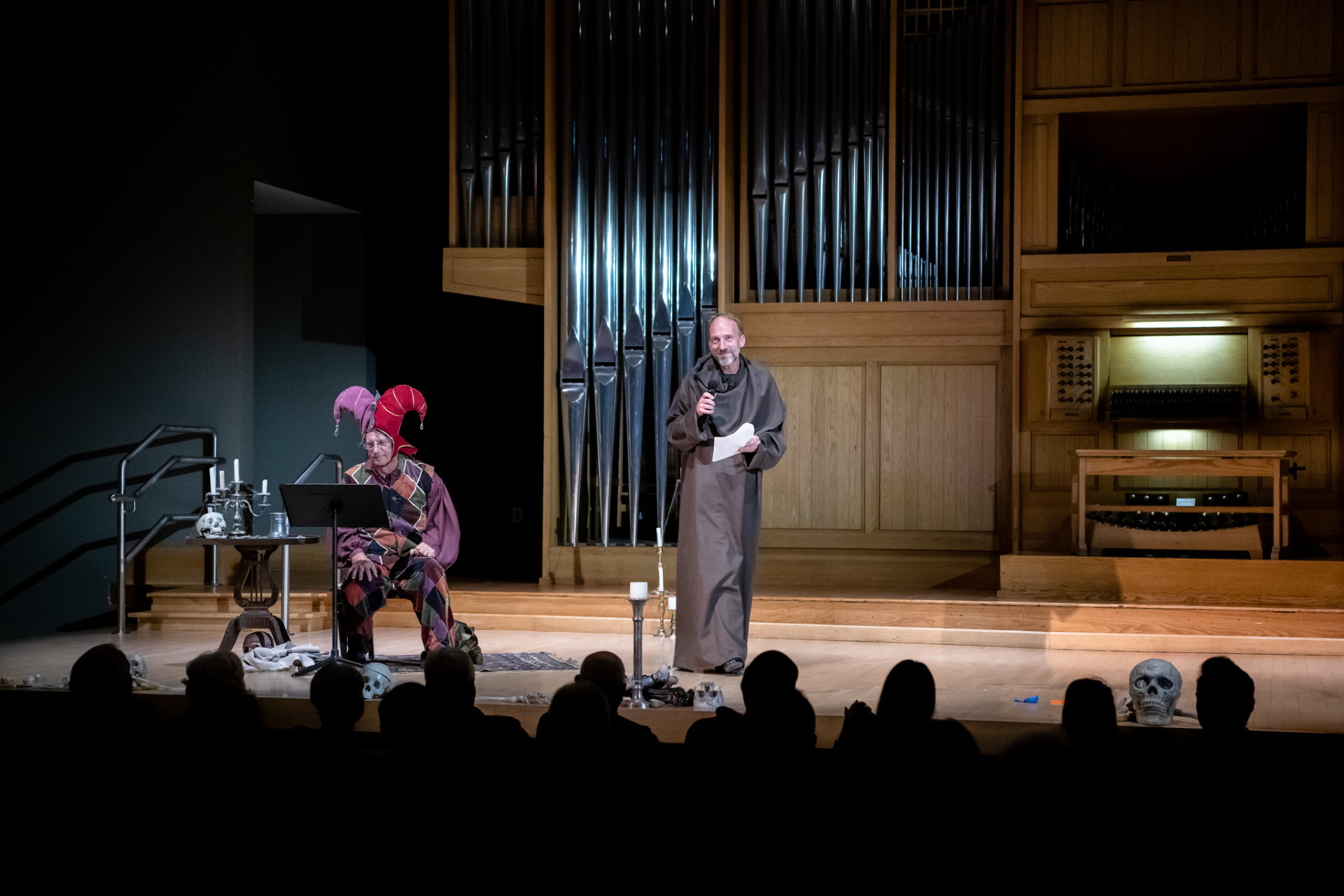
Maestro Wes Kenney and Organ Professor Joel Bacon entertain an audience with spooky stories and organ music during the Fall 2022 Halloween Organ Extravaganza at the University Center for the Arts. (Photo by Jennifer Clary)
While Kenney’s greatest influence might be on the student performers he works with, his impact on the faculty is apparent, too. Joel Bacon, a full professor of music in organ and keyboard and the keyboard area coordinator, said Kenney is amazing to watch with students.
“He’s demanding and also, somehow at the same time, extremely supportive,” Bacon said. “He knows how to pace a rehearsal so well, that when you feel like you’re stretched… he tells a corny joke or lightens the mood. I think it says a lot about him that he’s willing to be so silly and joking. He would have every right to take himself very seriously.”
James David, a professor of music in composition and music theory, has worked with Kenney to produce commissioned pieces for the CSU Symphony. David said he appreciates that Kenney is committed to the liberal arts model of education to teach students and the audience that a piece of music is more than just notes on a page.
“He always takes the time to provide the full context of a piece of music anytime he has it performed,” David said. “He’s really open and generous with the audience and with the students that are performing by giving that introduction and full context of the music. I think that really improves the audience’s engagement with the composition, and I’ve always appreciated that with my own works.”
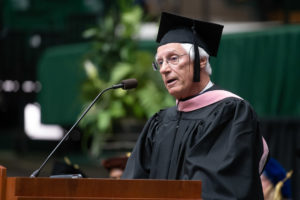
For his commencement address for Fall 2022, Kenney wanted to emphasize to graduates the importance of their liberal arts education, especially since many of them had completed their degrees during the COVID-19 pandemic.
“What we do in (the UCA) is constantly rediscover who we are as human beings,” Kenney said. “My greatest goal, especially for a university student, is to help them identify how much depth there is in the human condition. You can’t play Brahms and be cool at the same time. You have to wear your emotions out on your sleeve.
“I just want them to be excited about the arts,” Kenney said, “because if we do not excite the people who come through an institution such as CSU about what we do, it’s going to be too hard to keep it.”
In their own words: What do you think will be Maestro Wes Kenney’s legacy?
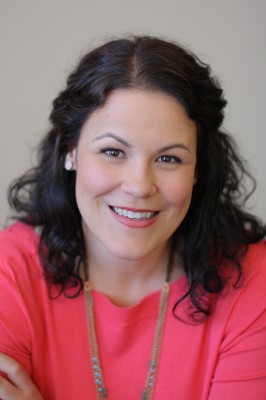
“Maestro Kenney’s legacy is that he pushes students to accomplish things they didn’t realize they could accomplish. He has challenged them in performing difficult, but deeply rewarding repertoire. Students come through the process gaining new musical and artistic perspectives, increased passion and self-confidence.”
– Tiffany Blake, associate professor of music in voice, voice area coordinator, and director of the Ralph Opera Program
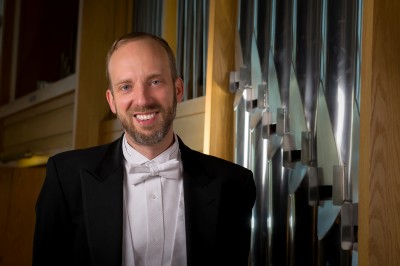
“It’s impossible to overstate how much he has done for our department. I remember some of the first orchestra concerts I attended here at CSU, where it seemed like the orchestra was even just struggling to tune. This semester, they’re preparing a Mahler symphony. That speaks volumes about how far he has brought our program in those years. I think a lot of professors say they believe in their students. Wes really shows it by trusting them with challenging music and inspiring them to find their fullest potential with it.”
– Joel Bacon, full professor of music in organ and keyboard, keyboard area coordinator, and Stewart and Sheron Golden Chair in Organ and Liturgical Studies
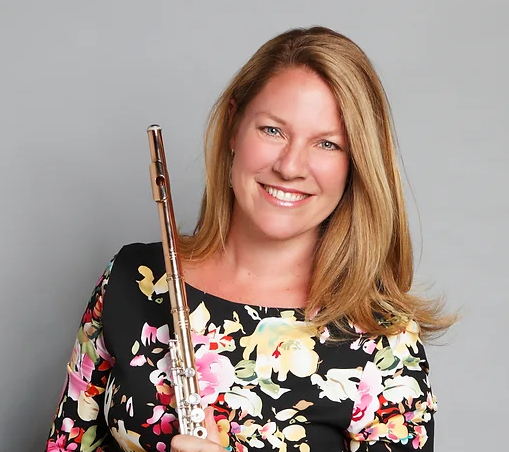
“Maestro Kenney leaves a legacy of music behind. His programming over the years will be missed. It was innovative, forward thinking, diverse and also steeped in the important history of symphonic works. Our students gained a wonderful education through his teaching. His concerts connected to audiences and always gave our students what they needed to grow as artists.”
– Michelle Stanley, professor of music in flute and director of Arts Management at the LEAP Institute
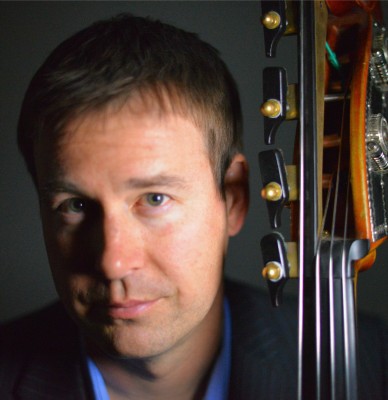
“The best legacy is the legacy of quality. (Kenney) established CSU as a legitimate option for top students to attend by building our orchestra in that way. That’s the biggest thing for his legacy. He built (this program) up in a way that leaves a very strong legacy behind and is really important for continuing the program.”
– Forest Greenough, associate professor of music in double bass and music theory
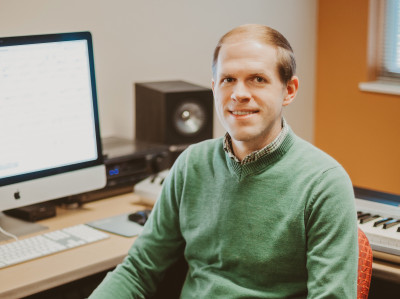
“It’s always been a super positive experience with Wes. I can’t imagine a more generous and willing partner as an artist. It’s really special to have someone like Wes to work with. He brought a level of professionalism and a level of musicianship that the orchestra had never had before. I think that filtered out to every aspect of the music program. Every area has continued to build on his leadership there. It’s been an amazing, transformative process. It’s been really remarkable to see how his leadership and how that attitude has permeated into every level of the program here.”